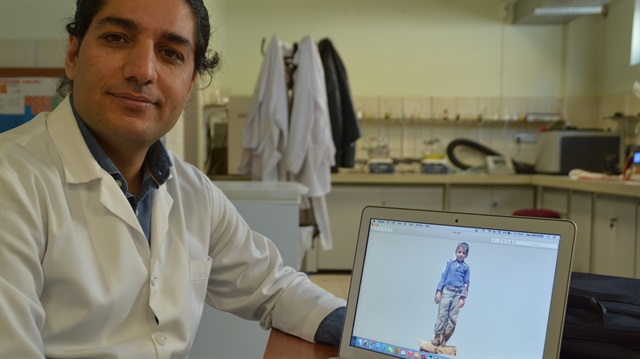
A scientist of Kurdish origin in Turkey might have expected to be killed by a terrorist attack, but perhaps he would not have imagined becoming an academic in the predominantly Kurdish province of Siirt, the Southeast.
Hacı Baykara, the sole survivor from an assault launched in a Siirt town by the outlawed Kurdistan Workers Party, or PKK, became an academic in the Science and Literature Faculty at the University of Siirt after being raised by the special operations police.
Baykara’s life was saved by his mother, who put him in a sack of wheat when PKK terrorists stormed Kılıçkaya village near the province’s Eruh town in 1987. All of his relatives were burned to death during the PKK ambush which claimed 15 lives at least.
“I was eight years old when the PKK launched this attack. I remember my mother placing me in a sack. The armed group burned down 25 houses in the village. I saw them burning my uncle to death,” said Baykara, an Assistant Professor in the Chemistry Department.
The members of the Special Forces unit, who rushed to the village after the terrorist attack, have covered his back since the first day they had discovered him hiding inside of a sack. The Special Forces Unit has financially supported the young Kurdish boy for 11 years. “I have never interrupted my studies, because they were always covering my back. I owe these officers too much. They were always with us even while we were having financial distress after my dad had a stroke,” he said.
Baykara studied chemistry at Kafkas University in Kars province. He graduated at the top of his class. Years after, when he was back in his hometown, Baykara understood he was eager to work for the university in this province. “I have attended several workshops abroad. Currently, as an advisor, I have supported many doctoral students from abroad and in Turkey,” he said.
The academic fellows in the village were displaced to different locations; they were not familiar with the settled life styles and they were forced to live in poverty. “They were wealthy men in the village, but they were living in poverty in a big city they were forced to settle,” said Baykara.
“People, who had two large properties in the village, were taking shelter in a one-room property in the province they had moved to. Think of an eight-person family and a one-room flat. They are all in the same space,” he said. “For my family, the circumstances were exactly the same as the others faced in their new lives. Like the others, we left everything behind us and moved into the province although we had 26 deeded land parcels in the village.”
Baykara believes that Turkey’s ongoing peace process is a promising process for both Turks and Kurds. He said the process must proceed as far as it can until the moment when we say farewell to arms as a whole to have a peaceful world we can bequeath for the next generations.
“There is no loser in the peace while there is no winner in the war. We lost a generation due to illiteracy over the past three decades, but I still believe we can have a safe and secure environment in which people will fill the concept of brotherhood,” said Baykara.
Baykara currently works on his first book, titled “Turkey’s Milan”, which tells of a PKK attack which claimed 25 lives in his native village.














